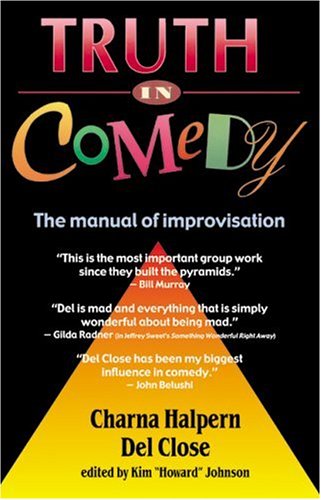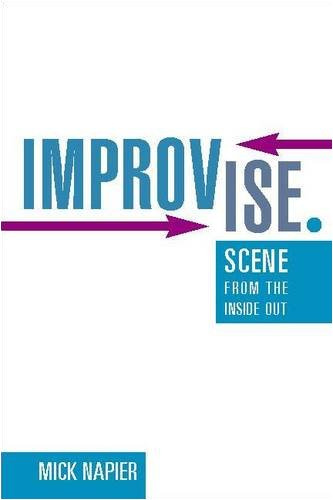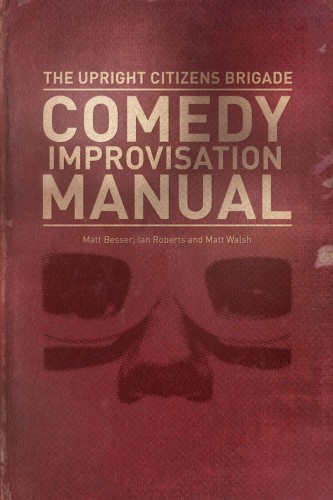Whether you have been performing improv for years or you’re just beginning, chances are you have heard that the only places to train are in the “big three” cities; Los Angeles, Chicago and New York.
Not everybody has the leeway in their personal lives to pack up their belongings and move to Chicago. You might be working your way through school, have obligations at home or you’re just not ready.
Have no fear; there are ways to expand your knowledge about improv without permanently moving to a new city.
Read Your Bible(s)
There are several books covering the topic of improv from the biggest comedy training centers in the U.S.
Truth in Comedy by Del Close & Charna Halpern

Published in 1994, Truth in Comedy is the first “great” book covering improv. TiC was written by Del Close and his partner Charna Halpern. The pair are the founders of the Improv Olympic theater in Chicago and developed the longform structure “The Harold”.
TiC goes into great depth in explaining the Harold format and touches on nearly every aspect of iO style of improvisation. iO basics include trusting your scene partner, agreement, group mind, initiations and building an environment. While Truth in Comedy might not be everyone’s cup of tea it is a must-read for anyone hoping to learn the beginnings of longform improv.
Improvise by Mick Napier

Napier’s Improvise is a bit contrarian to Truth in Comedy. While it covers similar themes like acceptance and supporting your partner it goes about it in a different way. Napier is the founder of the anarchic Annoyance Theater and urges improvisers to support their partners by first supporting themselves.
There is less focus on the “game” of the scene and more focus on energy and commitment to your instincts. Traditional improvisers may find Napier’s approach a bit chaotic but this is a great way to truly free yourself of inhibitions on stage.
The Upright Citizen’s Brigade Comedy Improvisational Manuel by Matt Besser, Ian Roberts & Matt Walsh

UCB has arguably become the go-to training center for young people in Los Angeles and New York. Revealed in July, The UCB Improv Manuel has been years in the making and covers the UCB philosophy in detail. The Manuel puts a great emphasis in finding “the game” of the scene, and working with a group in various long form structures.
The trio provides exercises for every concept presented in the book which can be implemented in any team. This may be the new kid on the block but all the information is applicable to beginners and experienced improvisers.
Find a School Near You
Most cities in the U.S. will have at least one improv theater regularly performing shows and teaching classes. A quick Google search of “long-form improv (nearest city)” will reveal a school near you. The next step is to find an instructor that fits your needs. If the information isn’t available online, call the school and ask where a particular instructor has trained.
Most people who have opened a brick and mortar improv theater are transplants from New York, Chicago, or Los Angeles and have experience at The Second City, Improv Olympic or The Annoyance.
I highly recommend finding an instructor who has trained at any of those schools. These instructors will typically run the exact same exercises you will find at these schools without being watered down by the “telephone effect”. Although taking classes from somebody who has attended a comedy school is in no way comparable to actually attending the school, classes are important because they throw you in an environment you are uncomfortable with. If you are accustomed to improvising with your college buddies you will get a culture shock when playing with a 45-year-old single mom who purchased a Groupon for improv classes.
Playing with people from all walks of life is almost more important than the bare bones instruction. An instructor at iO once told me 30% of the class in the instruction 70% is the people you meet.
Visit Festivals/Watch Improv

There are several improv festivals occurring throughout the U.S. every year. If you have an established team, submit yourself and hope for the best. Most improv festivals will offer exclusive workshops from top improvisers in the U.S. Even if your team is not accepted it’s important to simply watch improv at these festivals. You can see a multitude of different styles, structures and approaches to improv to expand your horizons.
Most major cities will host an improv festival once a year. Here is a short list of established improv festivals and competitions in U.S.
Professional
Del Close Marathon (New York City, NY)
Chicago Improv Festival (Chicago, IL)
LA Improv Festival (Los Angles, CA)
Out of Bounds Comedy Festival (Austin, TX)
College
College Improv Tournament (Multiple Locations)
Fracas! Improv Festival (USC, Los Angeles)
Sleep on a Couch
This tip is geared more towards college students or anybody with a time to spare in their personal lives. If you have a week, month or two months free in your yearly schedule you can use that time to travel to New York, Chicago or Los Angeles and do intensive improv training at one of the big schools.
During my college years I would spend my summer crashing on a friend’s couch in Chicago for $100 a month and I would take classes at Second City, The Annoyance, and improvOlympic.
You will need to save up some money as classes cost in between $200-$400 for an 8-week session. I visited Chicago with $1000 in my pocket then found a job washing dishes in an awful pizza restaurant . By temporarily transplanting yourself in one of the big cities you are not only giving yourself a leg ahead when you do eventually move away but you also learn techniques that you can take back to your team at home.
Nearly all improv schools suggest that you take the standard 8-week programs so you have time each week to absorb what you learned in your last lesson before returning to class. There is, however, the intensive option. The Upright Citizens Brigade, iO, and Annoyance all offer week-long intensives where you attend class 6 times a week and complete a level quickly. Additionally, iO offers their Summer Intensive which covers the entire iO program in 5 weeks for just over $1000.
Additionally, most schools offer free admission to any shows performed at their venue. It is paramount that you see any and all improv shows that your schedule permits.
Sounds great! But I don’t know anybody who lives out there.
This brings us back to visiting festivals and meeting new improvisers. The improv community is incredibly tight nit and many people will move to Chicago, NY, or LA after finishing school.
Like any “profession” improv is all about networking, if you know somebody through a festival who has moved to Chicago simply ask if they could use some help on their rent during the summer months, you’d be surprised (or maybe not) how many struggling comedians could use some extra cash after they make the big move.
Perform
The easiest thing you can do to hone your improv skills is to simply perform. Join your college improv troupe or start a team on your own. I have met so many people in Chicago who bemoan the fact their instincts haven’t progressed in the year they’ve been training but they never went out to performed. If you think that you can simply complete iO’s training program and you’ll automatically have a spot on a house team you are sorely mistaken (most of the time).
Like any type of education, improv classes are useless if you never apply them in the outside world. Check to see if your local improv theater has a cagematch and put a team together. Ask coffee shops if they have a comedy night and see if they will put your team up. If there is no comedy night in town- start your own. So many dive bars, and coffee shops are just happy to have customers in their venue. Don’t worry about making any money, the stage time is well worth it plus most bars will cover your tab for the night.
Michael Skarsten is a guest to Splitsider and regular contributor to Modern Thrill. He resides in Phoenix, AZ where he performs with the improvised teen drama Dawson’s Queef.